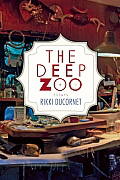Entering Ducornet’s Deep Zoo
Rikki Ducornet’s THE DEEP ZOO: ESSAYS
 ������ I���d love to see the world through Rikki Ducornet���s eyes, if only for a day. If only for an hour. If it���s anything like her newest collection of essays, The Deep Zoo, it���s an entirely magical, kaleidoscopic view.
������ I���d love to see the world through Rikki Ducornet���s eyes, if only for a day. If only for an hour. If it���s anything like her newest collection of essays, The Deep Zoo, it���s an entirely magical, kaleidoscopic view.
Even though the essays where written over journals, magazines and years, there���s a constant thread running through them all, the idea of that ���deep zoo,��� something Ducornet���s sees as the very essential pieces of an artist���s creative output; the themes they get stuck on and contemplate for life. The colors and emotions that stay present when you take away all the outer shapes and images of an artist���s work. The yearning present in a story���s conflict when you erase the circumstances. The mood and tones underlying every song on an artist���s LP.
In Ducornet���s eyes, everyone���s Deep Zoo is different. Based on this book, one can assume her own zoo holds the following: Animals, struggling through the world, dying naturally and beautifully. Ancient gods sharing their gifts, chief among them, Eros, god of love. Fairy tales, passed down through generations not because of their appealing lore, but their unapologetic truths.
Ducornet���s essays move all over the place, always trying to find the Deep Zoos of her subjects. And these folks themselves are fascinating. There are artists Margie McDonald, an experimental sculpture who creates a sea filled with creatures out of wires, aluminum, whatever she gets her hands on, and Linda Okazaki, whose paintings come alive with symbolism of animals as lovers (it should be little surprise that Ducornet herself is a painter, her understanding of art leaping across genres and materials).
There are discussions of literature. Ducornet calls on everyone from Kathryn Davis to Kant to measure the images she sees written on the pages of people such as Omensetter���s Luck, a novel published in the 1960s and lauded as a classic, or Sade���s 120 Days of Sodom. Obviously, the literature she finds fit to discuss in this collection finds no bounds.
There are looks into film ��� even the screen not too small or immature a platform for Ducornet���s concerning eye. Lost highway is scrutinized in comparison to Lynch���s other works and in comparison to myths of the Evil Eye.
But best of all are Ducornet���s look into mythology, the legends of Eros and of fairytales, and tied to this, her looks into her own work. Here we see her at her most vulnerable, trying to piece out the themes of her own work that she believes may yet endure, the aspects of her words and her earth she wishes the audience not soon forget.
A piece from one of the essays, ���The Practice of Obscurity,��� shows exactly the way Ducornet���s mind melts things together: ���For if Eve broke the rules, her other intention was to keep a garden. And if the apple is one she bakes into a pie, it is also the one that poisons Snow White and renders her comatose.���
Prepare to be smitten with allusion upon allusion upon illusion.




